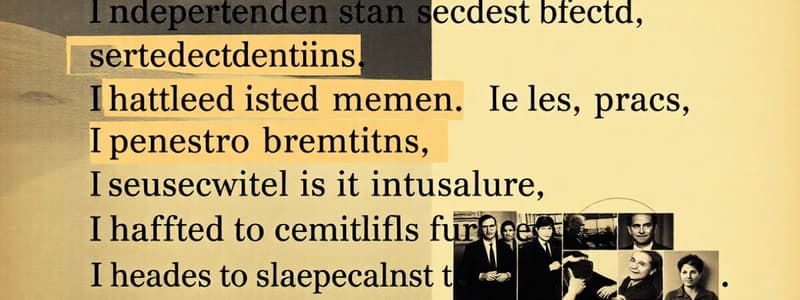Podcast
Questions and Answers
What is an independent clause?
What is an independent clause?
- A clause that modifies a noun in a sentence.
- A clause that contains both a subject and a verb but lacks a complete thought.
- A clause that cannot stand alone as a sentence.
- A clause that expresses a complete thought and can stand by itself as a sentence. (correct)
An independent clause can consist of multiple clauses combined together.
An independent clause can consist of multiple clauses combined together.
True (A)
Provide an example of an independent clause.
Provide an example of an independent clause.
I baked her a cake.
An independent clause expresses a _____ thought.
An independent clause expresses a _____ thought.
Match the following sentences with their type:
Match the following sentences with their type:
What is the primary function of an adjective clause?
What is the primary function of an adjective clause?
An adjective clause can stand alone as a complete sentence.
An adjective clause can stand alone as a complete sentence.
Which of the following sentences contains a dependent clause?
Which of the following sentences contains a dependent clause?
Provide an example of an adjective clause.
Provide an example of an adjective clause.
An adjective clause usually follows immediately after the ______ they modify.
An adjective clause usually follows immediately after the ______ they modify.
A dependent clause can stand alone as a complete sentence.
A dependent clause can stand alone as a complete sentence.
Match the following examples with their description:
Match the following examples with their description:
What are some common words that begin a dependent clause?
What are some common words that begin a dependent clause?
A dependent clause contains a ______ and its subject but cannot stand alone.
A dependent clause contains a ______ and its subject but cannot stand alone.
Match the following sentences to their corresponding dependent clauses:
Match the following sentences to their corresponding dependent clauses:
All clauses express a complete thought.
All clauses express a complete thought.
What are clauses that do not express complete thoughts called?
What are clauses that do not express complete thoughts called?
Every clause contains a ______ and a verb.
Every clause contains a ______ and a verb.
Match the types of clauses to their descriptions:
Match the types of clauses to their descriptions:
What does an adverb clause modify in a sentence?
What does an adverb clause modify in a sentence?
An adverb clause should be placed directly before the subject of the main clause.
An adverb clause should be placed directly before the subject of the main clause.
What type of information does an adverb clause provide?
What type of information does an adverb clause provide?
An adverb clause usually ends with a __________.
An adverb clause usually ends with a __________.
Match the following sentences with the type of information the adverb clause provides:
Match the following sentences with the type of information the adverb clause provides:
What function can a noun clause NOT serve?
What function can a noun clause NOT serve?
A noun clause can only be used as a subject in a sentence.
A noun clause can only be used as a subject in a sentence.
Provide an example of a noun clause functioning as a direct object.
Provide an example of a noun clause functioning as a direct object.
The sheriff gave whoever volunteered a ______.
The sheriff gave whoever volunteered a ______.
Match the following functions of noun clauses with their examples:
Match the following functions of noun clauses with their examples:
Which of the following is NOT a type of conjunction?
Which of the following is NOT a type of conjunction?
Coordinating conjunctions can be used to connect clauses of equal rank.
Coordinating conjunctions can be used to connect clauses of equal rank.
What is the primary function of a subordinating conjunction?
What is the primary function of a subordinating conjunction?
An example of a correlative conjunction is _______.
An example of a correlative conjunction is _______.
Match the following subordinating conjunctions with their examples:
Match the following subordinating conjunctions with their examples:
What does a prepositional phrase begin with?
What does a prepositional phrase begin with?
An appositive can stand alone as a complete sentence.
An appositive can stand alone as a complete sentence.
Which of the following sentences contains a noun clause?
Which of the following sentences contains a noun clause?
What is the function of a verbal in a sentence?
What is the function of a verbal in a sentence?
The introductory word in a noun clause always has a grammatical function within the clause.
The introductory word in a noun clause always has a grammatical function within the clause.
Provide an example of a noun clause introduced by 'whoever'.
Provide an example of a noun clause introduced by 'whoever'.
A verbal phrase contains a verbal and its group of related ______.
A verbal phrase contains a verbal and its group of related ______.
Match the type of phrase with its description:
Match the type of phrase with its description:
In the sentence 'Their complaint was _____ the milk smelled sour', the blank should be filled with which word?
In the sentence 'Their complaint was _____ the milk smelled sour', the blank should be filled with which word?
Match the following introductory words with their examples:
Match the following introductory words with their examples:
Which of the following is a feature of an independent clause?
Which of the following is a feature of an independent clause?
List one type of question to identify the function of a clause.
List one type of question to identify the function of a clause.
The beginning of a clause can either be a __________ or a subordinating conjunction.
The beginning of a clause can either be a __________ or a subordinating conjunction.
Match the types of clauses with their definitions:
Match the types of clauses with their definitions:
What is one function that a dependent clause can serve in a sentence?
What is one function that a dependent clause can serve in a sentence?
An adjective clause modifies a verb in a sentence.
An adjective clause modifies a verb in a sentence.
What are three examples of subordinating conjunctions?
What are three examples of subordinating conjunctions?
Flashcards
Independent Clause
Independent Clause
A group of words that expresses a complete thought and can stand alone as a sentence.
Complete thought
Complete thought
An idea or statement that makes sense on its own.
Sentence
Sentence
A group of words that expresses a complete thought, containing a subject and verb.
Example of Independent Clause
Example of Independent Clause
Signup and view all the flashcards
Multiple Independent Clauses
Multiple Independent Clauses
Signup and view all the flashcards
Clause
Clause
Signup and view all the flashcards
Clause roles
Clause roles
Signup and view all the flashcards
Subject & Verb
Subject & Verb
Signup and view all the flashcards
Dependent Clause Example
Dependent Clause Example
Signup and view all the flashcards
Dependent Clause Function
Dependent Clause Function
Signup and view all the flashcards
Dependent Clause Starter Words
Dependent Clause Starter Words
Signup and view all the flashcards
Dependent Clause with 'who', 'which', 'that'
Dependent Clause with 'who', 'which', 'that'
Signup and view all the flashcards
Dependent clause vs Independent clause
Dependent clause vs Independent clause
Signup and view all the flashcards
Noun Clause as Subject
Noun Clause as Subject
Signup and view all the flashcards
Noun Clause as Complement
Noun Clause as Complement
Signup and view all the flashcards
Noun Clause as Direct Object
Noun Clause as Direct Object
Signup and view all the flashcards
Noun Clause as Object of Preposition
Noun Clause as Object of Preposition
Signup and view all the flashcards
Noun Clause Function
Noun Clause Function
Signup and view all the flashcards
Subordinating Conjunction
Subordinating Conjunction
Signup and view all the flashcards
Adverb Clause
Adverb Clause
Signup and view all the flashcards
Coordinating Conjunctions
Coordinating Conjunctions
Signup and view all the flashcards
Correlative Conjunctions
Correlative Conjunctions
Signup and view all the flashcards
Examples of Subordinating Conjunctions
Examples of Subordinating Conjunctions
Signup and view all the flashcards
Adjective Clause
Adjective Clause
Signup and view all the flashcards
What does an adjective clause modify?
What does an adjective clause modify?
Signup and view all the flashcards
Position of Adjective Clause
Position of Adjective Clause
Signup and view all the flashcards
Example: 'The woman who is in the car'
Example: 'The woman who is in the car'
Signup and view all the flashcards
Example: 'Slides that she had taken in Egypt'
Example: 'Slides that she had taken in Egypt'
Signup and view all the flashcards
Adverb clause function
Adverb clause function
Signup and view all the flashcards
Adverb clause examples
Adverb clause examples
Signup and view all the flashcards
Adverb clause punctuation
Adverb clause punctuation
Signup and view all the flashcards
Adverb clause vs. phrase
Adverb clause vs. phrase
Signup and view all the flashcards
Noun Clause
Noun Clause
Signup and view all the flashcards
Introductory Word Function
Introductory Word Function
Signup and view all the flashcards
Noun Clause as Predicate Nominative
Noun Clause as Predicate Nominative
Signup and view all the flashcards
What is a phrase?
What is a phrase?
Signup and view all the flashcards
What is a prepositional phrase?
What is a prepositional phrase?
Signup and view all the flashcards
Appositive
Appositive
Signup and view all the flashcards
Verbal
Verbal
Signup and view all the flashcards
Verbal phrase
Verbal phrase
Signup and view all the flashcards
What is an independent clause?
What is an independent clause?
Signup and view all the flashcards
What is a dependent clause?
What is a dependent clause?
Signup and view all the flashcards
How to identify a dependent clause?
How to identify a dependent clause?
Signup and view all the flashcards
What is a noun clause?
What is a noun clause?
Signup and view all the flashcards
Subject Noun Clause
Subject Noun Clause
Signup and view all the flashcards
Object Noun Clause
Object Noun Clause
Signup and view all the flashcards
Study Notes
Independent Clause
- An independent clause expresses a complete thought and can stand by itself as a sentence.
- Examples:
- I baked her a cake.
- Since it was my mother's birthday, I baked her a cake.
- A sentence can have more than one independent clause.
- Examples:
- If you have worked with the soil, you are familiar with hummus.
- Humilis means "on the ground," and from this Latin word we derive the word "humility."
Studying That Suits You
Use AI to generate personalized quizzes and flashcards to suit your learning preferences.



